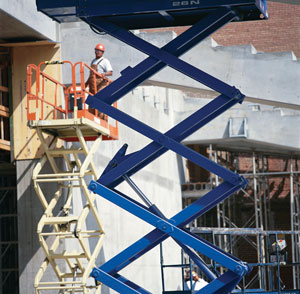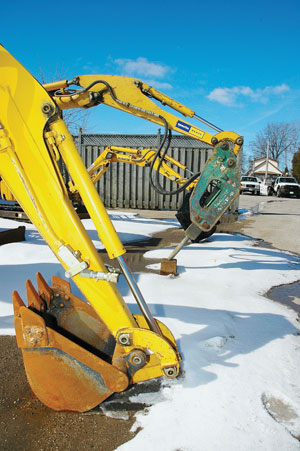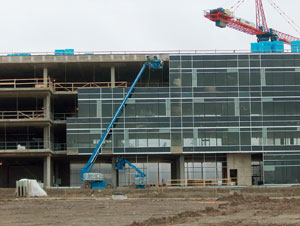
Cross country checkup
By Richard Porayko
Features Business IntelligenceThe forecast depends on where you do business in Canada.

|
The state of the economy in the US has affected prices of raw materials. As fuel, steel and other raw components used in the manufacturing of construction machinery rise, so do the related costs of manufacturers who, in turn, need to transfer that to customers by raising prices of their manufactured products.
It is apparent that the economic situation in the US is ugly and getting worse. While the US government’s financial bailout to the banks was designed to remedy the crisis, it will take time for it to take affect, as will the economic policies of its newly elected president.
As in past recessions, what happens in the US eventually happens here, and although the Canadian economy is still prone to this, certain sectors of the economy are cooling off faster than others.
Rental companies across the country are facing higher prices for the tools and equipment that they rent, so how are they coping? Canadian Rental Service magazine spoke with a handful of rental operators from across the country to find out.
 |
Reaction is mixed and the impact the economy is having on the rental industry so far varies from province to province. Most people in the rental industry say business is somewhat slower than it has been in the recent past but there is still plenty of optimism for the foreseeable future.
In areas like British Columbia and Alberta, where the provincial economies have been booming for the last several years, things are still busy but are slowing down noticeably. In other markets such as Saskatchewan and Manitoba, rental companies are experiencing a much welcomed growth period. Diversification continues to drive population-rich Ontario and Quebec, while the Maritimes are patiently waiting their turn.
“The economy has been pretty good in our market,” says Ben Fooks, manager at Drumheller Equipment Sales & Rentals in Alberta. “The oil patch has been extremely strong in the last couple years; however that has slowed down at the moment. But there still seems to be a lot of road and building construction. Housing construction has gone down however; they are not building as many houses.”

|
Fooks echoes what many other rental companies are saying, “Raw materials have gone up quite a bit but at the same time with the US dollar situation a lot of stuff has come down. For instance, we are a Bobcat dealer and some of their prices have gone down. But we are starting to see it come back up again with the steel surcharges. So things seem relatively stable all the way round from our standpoint.”
“We haven’t bought as much stuff this year as we have in the last three years but it was so busy in the last three years that we bought a lot of equipment.”
Fooks elaborates, “For instance, we’ve got a yard full of generators and light towers, where as two years ago we couldn’t keep anything in the yard. We’ve been busy enough with other stuff to offset it, to the point that where it’s not time to push the panic button. They say they are starting some drilling programs in the fall, and that’s what makes us go.”
Drumheller Equipment hasn’t raised its rental rates yet, but Fooks explains, “We have definitely raised the price that we charge back for fuel. Traditionally, rental companies charge high for fuel, it has balanced out for us, we’re earning as much as we ever did.”
He says it doesn’t seem to be an issue with customers because they sympathize with them. Some even bring equipment back full of fuel. “Although we are spending more, we are making more because we have raised what we are charging equally. Most of what we use gets charged back.”
Fooks is optimistic about the future, “I see the growth continuing, especially with Alberta. With that whole royalty issue, there was a bit of a consensus that everyone was going to pick up and go to Saskatchewan. The government in Alberta raised the royalty rates on what they were taking from the oil companies. They raised the royalties and things slowed down. There’s a lot of talk that they are starting production a lot more in Saskatchewan, which they hadn’t done in the past because the royalties were way too high. So Saskatchewan elected a new government and people started buying real estate there. Alberta’s not going to fall off the map either. Our outlook is pretty confident that everything is going to be good.”
“My customers aren’t really very optimistic, says Joe Dutton, owner of Coquitlam, BC, Austin Tool Rentals. “The homeowner segment is staying about the same, but construction is down a little bit.”
Dutton continues, “The guys with excavators and bobcats say they are starting to feel it. One of them said he has four dump trucks and a couple excavators and the dump trucks are sitting a lot more. Another guy bought a new machine from me, he had it for two months, he put a hundred hours on it, and he said he should have put that on in week and a half. There was no off season for these guys before, but they had their hay day for about three or four years. It’s not like it was. It might pick up tomorrow, who knows,” he says. “Luckily, we haven’t really seen our suppliers raise prices,” says Dutton. “I don’t worry about the surcharges. Two or three percent is the cost of doing business.” In fact, Dutton says prices are actually declining, “I’m charging the same price today as I was 20 years ago for renting a pressure washer.”
Dutton thinks it’s finally time for a price increase, “I am in the middle of raising my prices now. And it’s not just because of raw material prices rising, Home Depot has raised prices. And they already charge $10 – $15 per day more. My customers have upped their prices, everybody’s upping their prices. On deliveries, we raised those way up. The general public is so used to things going up, it doesn’t matter because they know that’s the way life is. We don’t get any questions. I was really surprised on my deliveries, because I raised that $15 – $20 a delivery and never had anyone complain, it was just ‘Yeah, OK, fine.’ Our customers didn’t even flinch. They just pay it and walk out.”
Dutton is undaunted by a slower economy, adding that rental companies can be flexible. “You just have to offer different equipment. You have to diversify and offer products that no one else has. I carry a lot of stuff that other rental companies don’t want. The high maintenance items, like chippers and stump grinders that take a lot of work when they come back. I can make more money on a small $10,000 item than a $40,000 piece of equipment. Because its specialty and I have it but no-one else does, the price is up there. People pay it and no-one complains.”
“Our business has had probably about a 25 percent increase from last year,” says Rob Clark of Clark’s Supply & Service Ltd. of Moose Jaw, Saskatchewan. “I see that continuing to grow. It doesn’t look like it’s slowing down at all. A lot of it is housing but that is starting to slow down already. However, there’s too much work still out there right now.”
Clark indicates that the prices he pays for equipment has changed much recently, “The dollar’s come down but the price of steel has gone up, so it’s pretty much leveled off,” he says, adding that he has not increased his rental rates, but he has increased his delivery charges. “Over the past five years we’ve probably tripled our delivery charges. Our customers don’t care because they are too busy to come get it anyways. They know that fuel is going up and they understand. We haven’t really noticed our competitors raising their prices. We are always pretty much the same. Our prices are pretty close.”
A couple years ago, the company tried to reduce fuel costs by experimenting with biofuels, but as Rob described it, “that was more trouble than it was worth because it plugs filters. Biofuel only has a six month shelf life and it’s not that much cheaper anyways. It actually caused more maintenance issues than anything else. We felt it wasn’t a good thing.”
Clark sees a bright future in his province, “I don’t think it’s going to slow down at all. Here in Saskatchewan, the next five years is going to be a pretty steady increase before we see anything dropping off.”
“We’ve had a very strong spring and summer and we hope it continues through the fall,” says Dave Higgins, VP of Higgins Event Rentals with locations in Toronto and Oakville, Ontario. “We have some pretty strong bookings and we think it looks good.”
Higgins explains that while business is strong, the cost of doing business is rising rapidly, “We’ve seen some higher fuel costs for sure. Our suppliers have also been raising their prices, whether it is an outright price increase or a surcharge of some sort.”
“We’ve put in a very modest price increase across the board and we’ve been increasing our delivery costs. For the most part our customers have been very understanding.
Higgins explains that his market (party and special event rentals) is relatively stable, “A lot of our events are recession ‘resistant’, if you are getting married, you might not have a five course meal, you might have four. They go ahead, but they scale it back.” Higgins hasn’t seen that happen yet, “We’ve been pretty lucky I think. In lean times, years ago there was also a lot of price cutting and I have not heard of that sort of thing so far either.”
Worst case scenario Higgins confides “We’ve been through a recession before; we’ve got some ideas for some cost cutting measures that we would have to put into place.”
Higgins is not waiting to react, in order to reduce fuel consumption the company has installed a GPS in its fleet where the dispatcher can keep an eye on exactly where each truck is. Higgins explains “just to make sure that our drivers are going in the most direct route for each delivery. It has worked out very well. Now it’s just part of the daily routine and no one has a problem with it.”
Terry Morin of Able Rental & Supply from Sudbury, Ontario, explains that with the high commodity prices, “things are going really strong in Sudbury. It’s not really the same as the rest of the country. I’d say that things are peaking because of the high commodity prices. Construction, homeowner and commercial are all growing. It’s going to continue to grow.”
Morin continues, “It’s quite busy right now. The trades people, you can’t find them and the guys are struggling just for employees. So right now we’re pretty lucky there hasn’t been any barking at our costs.”
“Everything is going up. Pretty much every day you order something everything has gone up.” Morin explains that in most cases Able Rental has been able to pass those costs along to the customer. “We’ve pretty much had to. We’ve had no kickback on the delivery rate increases as of yet. But with regards to rental rates for equipment, it has pretty much stayed the same here for years; we can only get so much of an increase.”
Morin goes on, “Our competitors are some of the bigger rental yards, when you talk to them, they generally give you their card rate, but they do discount quite heavily. We just play by our own rates and we don’t worry about those other guys.”
“The Kingston area of Nova Scotia is awful quiet,” says Roland Amiault of Kingston, Nova Scotia’s Greenwood Rent-All Inc. “We have got lots of plans coming up, but the last couple years have been very quiet, especially in the rental industry and the whole commercial business too. I think Nova Scotia is overpriced and the wages aren’t high enough here to keep the economy going.”
“My contractors are very quiet this year also. Maybe at the other end of the province it’s not like this, but here in Kingston, we are way, way down.”
Amirault continues “We’ve had to raise some prices of salable products and for the price of fuel. We can’t really reduce our fuel consumption. When things got to go, they got to go. You could stay parked until you have a full load but then you might lose the rent. It’s all about service.”
“Everything keeps going up but the rental rates.” Amirault explains “We have played a little with the rental rates, but then the product sits there, it doesn’t move. I know that everyone has been trying to raise their rates but there is always a competitor that’s going to give it away for nothing. Most people understand. It’s a big vicious circle, when I put my rates up, everyone else has to put their rates up too.”
Amirault sees a brighter future on the horizon, “We have a lot of projects coming up in the local area here starting in the spring. We’ve got CFB Greenwood that is going to start spending a bunch of money and updating a bunch of stuff. I guess we will have to wait and see.”
“Construction wise, it has never been better in Manitoba in the over 20 years that I’ve been here,” says Ed Dwyer, general manager of C&T rentals in Winnipeg, Manitoba.
“There’s lots of construction going on. There is money going into infrastructure, the floodway, the airport, personal care homes, apartment buildings, condos, bridges. The economy is growing. It looks very good for the next two years. It seemed that Manitoba was lagging behind and now we are catching up.”
None of Dwyer’s segments are slowing down, “We’re running on all cylinders here. The farmers are having a good year. The truckers are hurting because of the fuel costs, but Manitoba has a diversified economy. We don’t depend on a lot of exports to the States. We are very diversified.”
“Prices had been going down, now all of a sudden they are starting to go up again. We’re getting notices that the price of steel is going up. That’s what I keep hearing, the price of steel; and fuel.”
Dwyer continues, “It’s the cost of doing business here in Manitoba. If we were manufacturing products and competing against China, it would be different. But this is the service industry and everyone here has the same costs. If a few costs go up, we pass them along to the customers. The customers understand it. We raised our pick-up and delivery charges. We don’t do a fuel surcharge, we just increased our rates.”
The market’s rental rates are staying the same, however Dwyer notes there is less discounting, and “there seems to be a shortage of equipment.”
Dwyer reflects on the global outlook, “I would feel much better if the US economy would pick up. It affects us all because they start slowing down and they buy less from China and China buys less raw materials from us. It’s a circle. We’re small potatoes. We have to watch out for the big picture which is China and the US. I see good things for the next two years in Manitoba. It’s anybody’s guess what’s going to happen then, because you can’t turn the switch off that quick. Housing prices are going up. Houses are being built. People are spending money on renovations and landscaping and those sorts of things, when that slows down then we know what’s coming!”
Richard Porayko is a freelance writer based in Coquitlam, BC.
Print this page